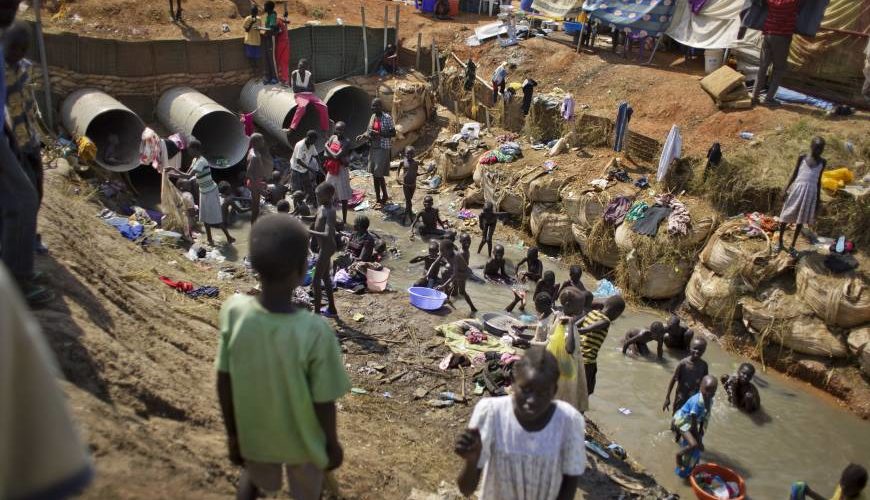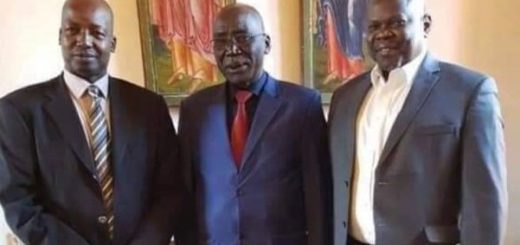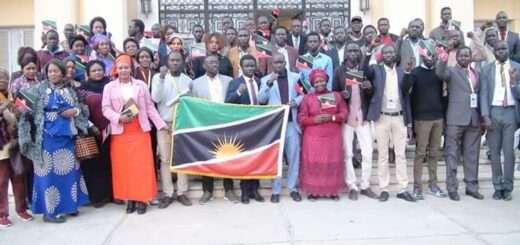Analysis: The Fallacy of Legitimacy

The era in which the regime in Juba can ride on the back of history has long passed. Power associated with liberation ideals previously espoused in the names of the Sudan People’s Liberation Movement has long decayed.
The arch-rivalry between Salva Kiir and Riek Machar cannot be the basis for continued war and neither should it be the single formula for peace in South Sudan. For if the latter were allowed; then unity between Kiir and Riek will render the majority of South Sudanese as “spoils of this bitter arch-rivalry”.
The National Salvation Front (NAS) under the leadership of its chairman and commander-in-chief Gen. Thomas Cirillo Swaka is a new wind of change that is fast sweeping across most of the Equatoria region and is fast-approaching other parts of South Sudan as it continues to mobilize ordinary citizens to join the struggle to restore the unity and dignity of South Sudanese.
“Mass killings, atrocities, sexual violence, human rights abuses; bloody internal rivalries and massive counter-violence and financial crimes by other state-actors,” are a rather conservative description of the regime in Juba under the marriage between Salva Kiir, Riek Machar and other sycophant political-military opportunists who have taken the people of South Sudan hostage.
A government that uses its monopoly on violence to destroy the social fabric of its citizens is an insult to any legitimacy
A government that uses its monopoly on violence to destroy the social fabric of its citizens is an insult to any legitimacy. How can the regime in Juba have any moral standing when the credibility of its leaders lay in tatters, its claims to be seen as legitimate irreparably tainted by the blood of innocent children and women; raped and killed under their orders!
It is fair to conclude that a downward spiral which is characterized by intensified violence and radicalization of extremist ethnic militias on the one hand and by a rapid process of delegitimization on the other, are all but inevitable.
We must first look closely at the background to the current peace deal, the dead Revitalized Agreement on the Resolution of the Conflict in South Sudan (R-ARCISS) – that was a last-ditch effort by the former president of Sudan, now jailbird Omar Bashir and President Yoweri Museveni of Uganda.
“Kiir told Machar that he would accept his return as a private citizen but would not work with him again…”
“Kiir told Machar that he would accept his return as a private citizen but would not work with him again. Kiir then insisted that Machar appoint someone to serve as first vice president in his stead. –Machar said no, and the meeting ended in a stalemate.” –June 2018 in Addis Ababa, Ethiopia.
In hindsight, the initial proposal by the former Sudanese President Bashir, a radical but thin outline for a new power structure in South Sudan “involving spreading government officials across three national capitals” may not have been worse. “But Machar rejected it too”.
Crisis Group’s South Sudan Senior Analyst Alan Boswell later concluded of the Khartoum Talks that “Oil money has been at the heart of the Khartoum—Juba rapprochement –and it will also be central to any lasting peace in South Sudan”.
It is not surprising that even with the ouster of President Bashir and his inner circle; the R-ARCISS was signed and quickly thrown into the dustbin of a long history of dishonored agreements.
The only constant fuel for the energy that went into the sham peace process in the Sudanese capital was the black gold in South Sudan.
How then can the appearance of peace be conflated with the miserable lives and shattered livelihoods of ordinary citizens; when in essence, the interests of, at least our (north) Sudanese brothers, were spelt in bold in the peace agreement! –“Sudan to coordinate with South Sudan on oil field security and rehabilitation in the former Unity state”.
This article discusses two pertinent issues: 1) perceptions of legitimacy as projected by the regime in Juba and 2) the status of a cessation of hostilities agreement that the same regime has abused as its militia has continued to rape women, kill innocent civilians, displaced tens of thousands, destroy community livelihoods, cause hunger and starvation.
Boastful utterances of the regime’s Cabinet Affairs Minister Dr Martin Elia Lomuro, including open references to his leadership of a new ethnic-Pojulu militia, code-named #Enough group; are a slap in the face to the same regime’s supposed commitment to the CoH agreement it signed with National Salvation Front (and other armed liberation movements) in December 2017.
Needless to mention that the same Lomuro continues to make a laughing stock of United States sanctions for his role in perpetuating South Sudan’s years-long conflict by obstructing the stalled R-ARCISS. The Treasury accuses Lomuro of “recruiting and organising local militias to attack opposition forces in South Sudan”.
“We are designating two cabinet-ranking officials [Martin Elia Lomuro and Kuol Manyang Juuk] in the South Sudanese government for their role in inhibiting political unification, expanding the conflict and profiting from South Sudan’s war economy,” Deputy Treasury Secretary Justin Muzinich explained in December 2019.
“…NAS revolutionary forces are closer to the local people, respect international humanitarian law comes without any surprise to the world!”
The reality that NAS revolutionary forces are closer to the local people, respect international humanitarian law; continue to coordinate their activities with and provide humanitarian access to combat areas; comes without any surprise to the world. Unfortunately, the regime in Juba has interpreted this unique relationship NAS has cultivated as a people’s liberation movement and used it against the local population.
Members of Lomuro’s #Enough militia have deliberately used this tense situation to win the patronage of the National Security leadership, especially the confidence of Akol Koor, by providing false information on suspected anti-government individuals. This has led to planned and coordinated attacks on civilian movements and temporary resettlements in the forests around Morobo, Lainya and Yei.
Innocent non-combatant civilians have paid with their lives for the actions of the misguided information supplied by the #Enough militia.
A silver lining, however, is the fact that under the guidance of the #Enough militia; many SPLA-IO and SSPDF forces and other allied militia have fallen into NAS several ambushes in the surrounding forests.
As a consequence more violence by the Juba regime has led to less legitimacy, and less legitimacy has resulted in more violence from the regime’s militias…
As a consequence more violence by the Juba regime has led to less legitimacy, and less legitimacy has resulted in more violence from the regime’s militias on the ground. Scorch earth campaigns by these militias have instead solidified the resolve of the local communities to see the revolution to its logical end—“restoration of the unity and dignity of the people”.
On the other hand, the leadership of National Salvation Front is committed to all international humanitarian law. However, considering the actions of the militia allied to both President Kiir and his deputy Riek; it is now imperative that the regime in Juba is treated as what it is.
The international community must exert pressure for the government to perhaps shelf its obligations under international humanitarian law, and instead subject itself to the three “Deeds of Commitment” of the Geneva Call.
Juba’s allied militia have demonstrated a complete disregard for article 3 GC-IV of the Geneva Conventions outlining rules regarding the humane treatment of all persons in enemy hands. The article explicitly forbids murder, mutilation, torture, cruel, humiliating and degrading treatment, the taking of hostages, and being submitted to an unfair trial. It would thus be an impossible task to subject the regime in Juba to nation-state obligations when its allied militia cannot respect the most basic principles of a cessation of hostilities agreement.
It is time for the Inter-Governmental Authority on Development (IGAD), the African Union (AU), Troika to make two vital choices: i) declare the CoH agreement officially void and ii) pursue a different strategy that avoids the shortcomings of the foregoing CoH agreement.
The region cannot continue to idly allow the regime in Juba to hide behind the ‘grey area’ of its obligations
The region cannot continue to idly allow the regime in Juba to hide behind the “grey area” of its obligations to the cessation of hostilities agreement it signed with NAS. Militias allied to the regime are part and parcel of all internal, regional and international obligations under international humanitarian law, including strict observance of the terms of the CoH agreement of 2017.
While NAS reserves unequivocal right to respond in self-defense to the aggression of the regime’s allied militia; its remains fully committed to the terms of the cessation of hostilities agreement of 2017; and insists that war by militia proxy adopted by the Juba regime must be resisted by all in the region and on the international league of nations.
“The regime’s clear strategy of targeting civilians and opposition signatories to the 2017 CoH agreement – as well as its continued blocking of humanitarian aid to multiple besieged areas, indicate it is no longer meaningful in the military or political sense,” intimated NAS Spokesperson Suba Samuel.
Suba explained that the CoH has had the potential to allow regional and international media to ignore the aggression of the regime’s allied militia on civilian populations in the Equatoria region and all other areas where revolutionary forces have deployments— “as though the signature of the Khartoum Declaration (R-ARCISS) were an end to the war and resumption of peace –which it clearly is not”.
The military leadership of NAS have revealed that “government militia have continued to attack our positions, rape and kill civilians living in close proximity to our positions –as though the CoH agreement did not exist.”
Insisting on building a political process on a CoH agreement that is only a figment of the wildest imagination only serves to alienate important opposition actors from any future genuine peace processes. To allow the regime’s militia to continue their aggression on NAS positions and at the same time pretend that the regime is a serious partner in the implementation of the Rome Declaration is a futile approach, and sadly the cost is often in terms of human lives. —there is clearly no ceasefire on the ground.
“…we must ask frank questions: Can the failing CoH agreement continue to be a useful stand-alone strategy without external pressure?”
Thus, we must ask frank questions: Can the failing CoH agreement continue to be a useful stand-alone strategy; without any meaningful, unbiased and objective military pressure from Sudan and Uganda –who are after all still the backers of the R-ARCISS, irrespective of whether that sham process failed to include all parties, especially those who stood their ground on a requirement for the agreement to explicitly seek to address the root causes of the conflict in South Sudan?
The other question is whether NAS and other armed forces who continue to respond in self-defense to the aggression of Juba’s militia and their counter-insurgency campaigns— most of which have resulted in the indiscriminate killing of civilians, rape of women, torture, forced displacement of local communities and deliberately causing shortages in food and other basic supplies —can continue to hold onto the CoH fiction without undermining their own standing and legitimacy among the local population, who continue to pay the ultimate price, for alleged contribution to the revolution against the dictatorship in Juba!
The senior leadership of NAS, of course, maintains that its position is clear. “It can not explicitly say that the CoH is void”. Though, the CoH may not be in better health than a corpse awaiting post-mortem. NAS is willing to adhere to the terms of the 2017 cessation of hostilities agreement if the regime in Juba and its allied militia in the union of Kiir-Riek adhere to it too.
As the violence increases during this rainy season and evidenced by the militia deployments of the Juba regime, the CoH is rendered nothing less than an Italian (Rome Declaration) political window dressing, showing once again the desperation of Sudan and Uganda for a bad peace at whatever cost.
Can the CoH be miraculously revived? Your guess is as good as any. The Troika must fill the vacuum created by the departure of a fatigued United States government; and consider ways of revising the CoH, enforcing it; or if it is beyond repair, doing away with it and finding a new solution that addresses the reality of the problem.
International Crisis Group makes this bold suggestion: “Begin a new mediation track with Thomas Cirillo” and “the government should halt its ill-advised military offensive against Cirillo’s forces”.
By NAS News Desk




1 Response
[…] Analysis: The Fallacy of Legitimacy […]